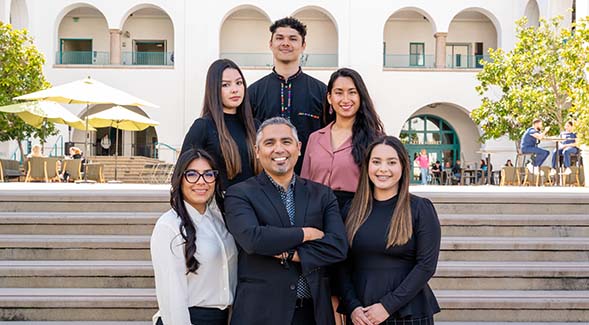HSI Leader Selected for Hispanic Colleges Leadership Academy
Emilio Ulloa is among 50 fellows in the fifth cohort of the training program, offered through the Hispanic Association of Colleges and Universities.

All too often in higher education, Emilio Ulloa has observed, learning how to function effectively in a leadership role winds up coming on-the-job.
Ulloa, San Diego State University’s associate chief diversity officer for HSI and regional affairs, said the typical path to a top administrative slot starts in academia itself. A leader may be very well-grounded in English literature, economics — or in Ulloa’s case, psychology — but not so much in the nuts and bolts of the upper echelons of higher learning.
The Hispanic Association of Colleges and Universities (HACU) aims to play a role in changing that pattern at Hispanic-Serving Institutions (HSI) like SDSU.
Last week, the San Antonio-based organization selected Ulloa as one of 50 fellows for the fifth cohort of its Leadership Academy/La Academia de Liderazgo, designed to increase diverse representation in top administrative positions at U.S. colleges and universities. Ulloa is SDSU’s first fellow selected for the academy.
“What’s very appealing about this to me is that there are very few (programs) that are centered on developing your leadership skills but with a particular frame of reference to the Hispanic student population,” Ulloa said. “I like that as a focus.”
SDSU was designated an HSI by the U.S. Department of Education in 2012. HSIs must have at least a 25% enrollment of Hispanic undergraduate students — the actual figure in fall 2022 was 33% at SDSU and over 90% at SDSU Imperial Valley — and meet certain standards for the number of Pell Grant-eligible students.
In the one-year program, Ulloa will attend seminars in Chicago, Washington, D.C. and Salamanca, Spain, and work with HACU mentors.
It’s “a really great, exciting opportunity to connect with, and to get mentoring from someone who is at the highest level of administration for a HSI,” said Ulloa, a 1997 alumnus who began teaching at SDSU in 2003.
“Programs like these recognize that training, experience and mentoring are really efficient and appropriate ways to prepare people for (leadership) jobs,” Ulloa said. “And to be effective and not to have to learn by making mistakes … but rather by fast-tracking and providing structured training in the work of being an administrator in higher education.”
In his current position, part of SDSU’s Division of Student Affairs and Campus Diversity, Ulloa is in charge of governance that helps steward SDSU’s HSI designation, and directs a committee of more than 40 faculty, staff and students who make recommendations tied to the federal designation.
Ulloa noted the benefits of the leadership academy go well beyond his professional interests.
“A program like this in particular reminds you of what the ultimate goal is,” he said. “You’re learning skills that will help you to serve students better.”
Four additional California State University campuses — Bakersfield, Fresno, Long Beach and Cal Poly San Luis Obispo — have fellows in the 2023-24 cohort of the HACU Leadership Academy. Adela de la Torre, SDSU’s first Latinx president, serves on the HACU governing board.
In the image at top of page, the staff of the SDSU HSI and Regional Affairs office (clockwise from top center): Fernando Suarez (student), Melissa Gonzalez (assistant director), Valentina Rodriguez (student), Emilio Ulloa, (associate chief diversity officer), Wendy Mejia (program coordinator), Sophia Mendez (student).



